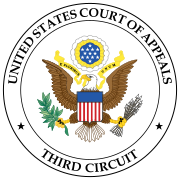| United States v. Vampire Nation | |
|---|---|
 | |
| Court | United States Court of Appeals for the Third Circuit |
| Full case name | United States of America v. Vampire Nation a/k/a Fredrik Von Hamilton a/k/a Frederick Hamilton Banks, Frederick H. Banks, Appellant. |
| Argued | May 16 2006 |
| Decided | June 20 2006 |
| Citation | 451 F.3d 189 |
| Case history | |
| Prior history | Defendant convicted at trial in Western District of Pennsylvania |
| Holding | |
| Since Federal Sentencing Guidelines have been held to be advisory, Rule 32(h) does not require notice of contemplated variance; provisions for in personam criminal forfeiture exist wherever statute authorizes civil forfeiture and is otherwise silent. Conviction and sentence affirmed. | |
| Court membership | |
| Judges sitting | Marjorie Rendell, Joseph F. Weis, Jr., Franklin Van Antwerpen |
| Case opinions | |
| Majority | Van Antwerpen |
| Laws applied | |
| Federal Rules of Criminal Procedure, Federal Sentencing Guidelines, Civil Asset Forfeiture Reform Act of 2000 | |
United States v. Vampire Nation, 451 F.3d 189, is a 2006 decision of the United States Court of Appeals for the Third Circuit regarding the Federal Sentencing Guidelines and asset forfeiture. A three-judge panel unanimously affirmed the conviction and sentence of Frederick Banks, a Pittsburgh man, on numerous felony charges resulting from fraudulent schemes carried out over the Internet. The case takes its title, which has been singled out as memorable[1] and included among lists of amusingly titled cases,[2] from one of Banks' aliases, an electronic music group of which he was the sole regular member.[3] He had filed the appeal under that name while representing himself.[4]
Banks had been offering discounted versions of Microsoft software online under different names as an Amazon.com reseller. His products were either pirated or deficient, costing some customers thousands of dollars, and eventually one complained to the FBI, who arrested Banks after a short investigation. At trial a jury convicted him of mail fraud, criminal copyright infringement and several other charges.
The judge sentenced Banks to five years in prison, varying the sentence upward by three months from the maximum range specified by the sentencing guidelines. An in personam criminal forfeiture judgment was also entered against him. Banks appealed to the Third Circuit, citing those among seven possible grounds for reversing the conviction. Foremost among them, he argued that notice of the possibility of variance was required prior to the sentencing and that the district court lacked the statutory authority to order the criminal forfeiture.
Judge Franklin Van Antwerpen wrote for the panel, which ruled for the government on all the issues. Other circuits had ruled on the variance issue, and he joined four of them in holding that Federal Rule of Criminal Procedure 32(h), which required a court to notify lawyers in advance of a contemplated departure, did not impose the same requirement on a variance. The forfeiture was likewise permitted since the mail fraud statute provided for civil forfeiture and, while it explicitly provided for criminal forfeiture only in cases where a financial institution was victimized, he did not find that Congress intended to limit it only to those cases via "a chain of cross-references."[5]
- ^ Kerr, Orin (May 27, 2009). "Great case name". The Volokh Conspiracy. Retrieved October 21, 2013.
- ^ Browning, John G. (February 2011). "Saying it with Style". Texas Bar Journal: 152–53.
- ^ Hayes, John (November 19, 2002). "Music Preview: Vampire Nation's new projects draw on history". Pittsburgh Post-Gazette. Retrieved October 18, 2013.
- ^ Chondos, David (June 20, 2006). "Comment at "Third Circuit deepens split on variance notice issue"". Sentencing Law and Policy. Retrieved October 18, 2013.
- ^ United States v. Vampire Nation, 451 F.3d 189, 200 (3rd Cir. 2006).